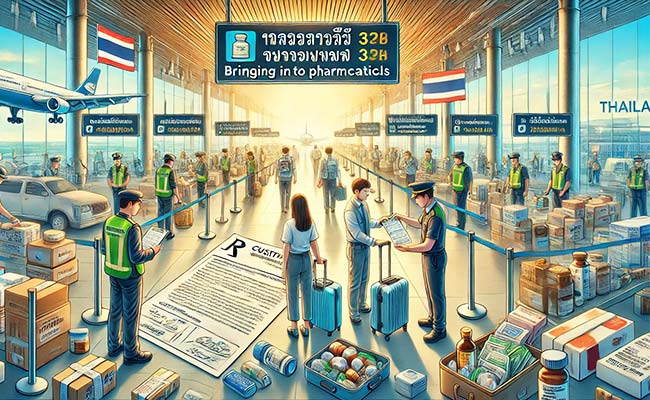Traveling to Thailand with medication requires careful planning to ensure you comply with Thai regulations. Whether you're bringing over-the-counter drugs or prescription medications, understanding the rules can save you from unnecessary hassle at customs.

What Medications Are Allowed?
Thailand has strict rules about bringing medication into the country, particularly controlled substances. Medications fall into three categories:
1. Unrestricted Medications:
Common over-the-counter drugs such as pain relievers (e.g., ibuprofen, acetaminophen), antacids, or antihistamines are generally allowed (see the end of the article for suggested travel-friendly medication).
2. Restricted Medications:
Prescription drugs like antibiotics or treatments for chronic conditions (e.g., high blood pressure, diabetes) can be brought in for personal use. However, documentation such as a prescription or doctor’s note is required.
3. Controlled Medications:
Certain medications, particularly those containing narcotics, psychotropics, or other regulated substances (e.g., morphine, codeine, some sleeping pills, or ADHD medications like Ritalin), fall under strict control. Bringing these requires special permission from the Thai Food and Drug Administration (FDA).
Examples of Controlled Substances:
The Thai Food and Drug Administration (FDA) classifies drugs into several categories, each with specific regulations:
Narcotics: Divided into five categories:
- Category 1: Dangerous narcotics with no medical use, such as heroin.
- Category 2: Narcotics with medical use, including morphine, cocaine, codeine, and medicinal opium.
- Category 3: Medicinal formulas containing Category 2 narcotics as ingredients, following specific regulations.
- Category 4: Chemicals used in producing Category 1 or 2 narcotics, like acetic anhydride.
- Category 5: Other narcotics not included in the previous categories.
Psychotropic Substances: Classified into four categories:
- Category 1: Substances with no medical use and high potential for abuse, such as mescaline, psilocybin, DMT, DET, and cathinone.
- Category 2: Substances with medical use and high potential for abuse, including phentermine, midazolam, zolpidem, methylphenidate, ketamine, and pseudoephedrine.
- Category 3: Substances with medical use and moderate potential for abuse, such as amobarbital, pentobarbital, and pentazocine.
- Category 4: Substances with medical use and low potential for abuse.
Traveling With Narcotics & Psychotropic Substances
Psychotropics:
For travelers carrying psychotropic substances classified under Categories 2, 3, and 4, no permit is required for personal use as long as the quantity does not exceed a 30-day supply as prescribed. However, these medications must be accompanied by a valid medical prescription.
Examples of these substances include:
- Category 2: alprazolam, methylphenidate, zolpidem
- Category 3: pentazocine, pentobarbital
- Category 4: diazepam, lorazepam, clonazepam
A list of controlled psychotropic substances can be found here on the Thai FDA website.
Narcotics:
Travelers who need to bring Category 2 narcotic drugs into Thailand must adhere to strict regulations. These medications can only be carried for personal use and must not exceed a 30-day supply as prescribed by a physician.
Before traveling, you must obtain a permit (Form IC-2) from the Thai Food and Drug Administration (FDA). This permit is mandatory, regardless of the quantity.
Common Category 2 narcotics include codeine, fentanyl, morphine, oxycodone, and methadone.
Failure to comply with these regulations could result in legal consequences, so travelers are strongly advised to secure proper documentation before their trip.
The permit application should be submitted online at least two weeks before departure, allowing the FDA approximately 3-5 working days to process it.
A list of controlled narcotic drugs can be found here on the Thai FDA website.
Visiting Thailand? Don't Forget Insurance!
I recommend SafetyWing.
Their Nomad Insurance Complete offers both comprehensive health and travel insurance. It includes coverage for doctor’s visits, preventative care, and prescriptions, while also protecting you against unexpected travel issues. For self-employed digital nomads, it's a game-changer.
Filing a claim is quick and easy—just complete a simple online form in as little as five minutes. You'll need your receipts, medical report, and bank details.
Reimbursements are processed in an average of 2.7 days. You can also track your claim status directly through your account on the SafetyWing website. Plus, their customer support team is available to assist you every step of the way.
Banned Substances:
Certain drugs, including narcotics (Categories 1 and 5) and psychotropic substances (Category 1), are strictly prohibited in Thailand. Examples of banned substances include amphetamines and GHB. Check the Thai FDA's website for the latest regulations before traveling.
Quantity Limitations:
Non-Controlled Medications: Travelers can bring these into Thailand for personal use in quantities not exceeding a 30-day supply as prescribed. A permit from the Thai FDA is not required for these medications.
Controlled Substances (Narcotics and Psychotropic Drugs): These are limited to a 30-day supply and do require prior approval through a permit from the Thai FDA before entering the country.
How to Bring Medication to Thailand
Follow these steps to ensure compliance:
1. Check Thai FDA List & Get a Permit (if required)
Visit the Thai FDA website to confirm whether your medication is unrestricted, restricted, or controlled.
If required, you must obtain a permit through an online application at least two weeks before your scheduled arrival. The application process can be completed via the official Thai FDA website.
During registration, you must input your personal details and then log in using your passport number and registered email address. Once logged in, select “Application for Carry-In” and complete the necessary sections, making sure the total amount of medication does not exceed the 90-day prescribed supply.
The Thai FDA typically processes applications within 3-5 working days. Once approved, the permit will be sent to your email, and a printed copy must be presented at customs upon arrival in Thailand. It is important to carry the permit along with the medications and any supporting medical documents to remain compliant with Thai regulations.
2. Carry Necessary Documentation
For Narcotic Drugs (Category 2):
- Passport Copy: A photocopy of your passport.
- Medical Prescription: A doctor's prescription detailing the medication, dosage, and duration of use.
- Permit: Obtain the IC-2 permit from the Thai FDA before departure.
For Psychotropic Substances (Categories 2, 3, and 4):
- Medical Prescription: A prescription from your doctor indicating the name, dosage, and duration of the medication.
3. Pack Medications Properly
Keep medications in their original packaging with the prescription label intact.
Pack them in your carry-on bag to prevent issues with lost luggage or exposure to extreme temperatures in the cargo hold.
4. Declare Your Medications
Upon arrival in Thailand, declare your medications at customs if they fall under the restricted or controlled categories. Keep documentation ready for inspection.
Quick Tips for Smooth Travel
- Plan Ahead: Start the process of obtaining permits for controlled medications at least 4-6 weeks before your trip. Make sure to have a valid prescription or a doctor's letter for each medication, particularly for controlled substances.
- Know Local Alternatives: Research if your medication is available in Thailand and whether a local prescription could be an alternative.
- There is a guide for carrying personal medications containing illegal substances into Thailand here.
What Happens If You Don’t Comply?
Failing to follow the proper procedure can result in:
- Confiscation of your medication at customs
- Fines or legal action, particularly for controlled substances
Essential Medications for Travel
When preparing for your trip, consider packing these permitted, essential medications to address common health concerns:
- Pain Relief: Keep paracetamol or ibuprofen handy for headaches, muscle aches, or fever.
- Allergy Relief: Antihistamines like cetirizine or loratadine can help with allergies or mild allergic reactions.
- Digestive Support: Loperamide is useful for managing diarrhea and ensuring comfort during your journey.
- Motion Sickness: Dimenhydrinate can prevent or alleviate nausea during travel.
If you’re traveling to rural or malaria-prone areas, consult your doctor about preventive treatments such as doxycycline. You might also consider vaccinations.
Conclusion
Bringing medication to Thailand doesn’t have to be complicated if you understand the rules and prepare accordingly. By checking Thai regulations, carrying the appropriate documentation, and planning ahead, you can ensure a smooth entry into the country and focus on enjoying your trip. Always consult your doctor and the Thai FDA for guidance tailored to your specific needs.
More Tips for a Better Life in Thailand
Get Good Health Insurance:
Start with a quick quote here from Cigna. Then you can compare it to other companies.
Improve Your Thai Skills:
Learning Thai makes life easier, and way more fun. I use Thaipod101. Get a free account by clicking here. It is really easy to use.
Send Money to Thailand:
If you are sending money to your loved one, or your own Thai bank account, try Wise here. It is fast and cheap. Me and the majority of my readers are using it.
Last Updated on



mark stephenson says
Feb 01, 2025 at 9:48 am
Michael Babcock says
https://en.fda.moph.go.th/entrepreneurs-medicines/category/faqs-medicines
https://en.fda.moph.go.th/our-services-new/our-services-frequently-asked-questions
You seem to say that I can apply to bring in a 90-day supply" Once logged in, select “Application for Carry-In” and complete the necessary sections, making sure the total amount of medication does not exceed the 90-day prescribed supply."
The only information I can find seems to limit this permit to drugs containing narcotic drugs. I can't find anything that indicates you can do this for "modern drug for personal use" (i.e., prescription drugs).
https://en.fda.moph.go.th/entrepreneurs-narcotic-drugs-and-psychotropic-substances/category/guidance-for-travelers-under-treatment-carrying-personal-medications-containing-narcotic-drugs-into-/
Jan 30, 2025 at 9:36 am
TheThailandLife says
Jan 30, 2025 at 6:28 pm